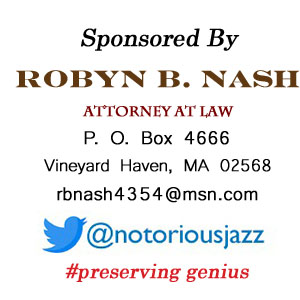
Daily Dose Of Jazz…
Chris Biscoe was born on February 5, 1947, in Pensford, Somerset, England and in 1963 taught himself to play alto saxophone and then started playing tenor, soprano, baritone, and also comparatively rare alto clarinet. Before he became a notable presence on the UK Jazz scene, he was a computer programmer.
From 1970 to 1973 Biscoe played with National Youth Jazz Orchestra in London, doing gigs with various other London-based bands of that period, including Redbrass. He worked with several notable jazz musicians during the Seventies such as Harry Beckett, Ken Hyder, Didier Levallet, Chris McGregor, Andy Sheppard, Graham Collier, Danilo Terenzi, Pete Hurt, Tommy Chase, Pete Saberton, Barry Guy, Dave Holdsworth, and Pete Jacobsen.
In 1979, Chris had a long-term association with Mike Westbrook touring throughout Europe and playing international festivals in Australia, Singapore, Hong Kong, Canada and the USA. In the same year, he also formed a quartet featuring Peter Jacobsen, expanded to a quintet in 1980, a sextet in 1986, and reformed as a quartet in 1987. During the Eighties he also recorded two albums.
During the late 1980s and 1990s, Biscoe toured and recorded with George Russell, Andy Sheppard, Liam Noble, Gail Thompson’s Jazz Africa, Harry Beckett, and also played in France with Didier Levallet’s groups and the collective band called Zhivaro. In 1991, he released a second cassette, Modern Alarms, and also recorded in the Dedication Orchestra in the Spirits Rejoice project.
Between 1997 and 2000, he became the first English musician to join the Orchestre National de Jazz. Multi-instrumentalist Chris Biscoe plays the alto, soprano, tenor and baritone saxophone, the alto clarinet, piccolo, and flute and continues to play and record.
More Posts: bandleader,clarinet,flute,history,instrumental,jazz,music,piccolo,saxophone
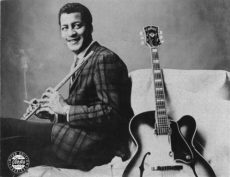
Three Wishes
Pannonica asked Les Spann if he was given three wishes what they would be his answer:
- “That the people of the world would understand each other.”
- “That I could look forward to consistent growth of perception till I die.”
- “That I could eat chicken as often as I want.”
*Excerpt from Three Wishes: An Intimate Look at Jazz Greats – Compiled and Photographed by Pannonica de Koenigswarter
More Posts: baroness,flute,guitar,history,instrumental,jazz,music,pannonica,three,wishes
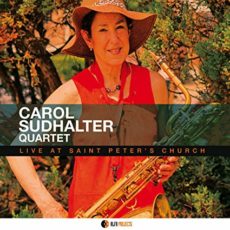
Daily Dose Of Jazz…
Carol Stearns Sudhalter was born on January 5, 1943 in Newton, Massachusetts and grew up in a musical family. Her father Albert played the alto saxophone in the New England area, a brother played baritone saxophone and one brother who played trumpet, cornet and wrote award-winning books on jazz.
In the early Sixties, Sudhalter began to play the flute while majoring in biology at Smith College. She continued to study flute with private teachers in Washington DC, New York, Boston, Israel, and Italy until 1978. She studied theory and Third Stream music with Ran Blake and Phil Wilson at the New England Conservatory of Music. From the 1970s on she has been teaching piano, saxophone, and flute privately, at Mannes College, and for the New York Pops Salute to Music Program.
1975 saw Carol deciding to take up the saxophone, and by 1978 relocated from Boston to New York City to join the first all-women Latin band, Latin Fever, produced by Larry Harlow. In 1986 she founded the Astoria Big Band, and she has performed with Sarah McLawler, Etta Jones, Chico Freeman, Jimmy McGriff, Duffy Jackson, and others around the New York jazz clubs, as well as domestic, Italian and British jazz festivals.
She initiated the Jazz Monday concerts at Athens Square Park between 1989 and 2001, along with several other local festivals in Queens where she resides.
A member of the Jazz Journalists Association, Sudhalter also has a chapter in Leslie Gourse’s Madame Jazz and in W. Royal Stokes’ Growing Up With Jazz. In 2012 she was nominated for the 2012 International Down Beat Readers’ Jazz Poll, and was voted 9th place in the category “Best Jazz Flutist”. She has recorded eight albums as a leader, one as a sideman, and the tenor and baritone saxophonist, flutist and pianist Carol Sudhalter continues to perform and educate.

More Posts: bandleader,composer,flute,history,instrumental,jazz,music,piano,saxophone
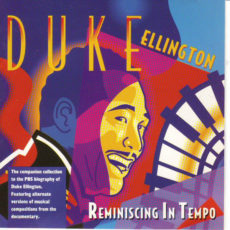
Daily Dose Of Jazz…
Harold “Geezil” Minerve was born in Havana, Cuba on January 3, 1922, and raised in Florida and began playing music at age 12. He played with drummer Jeff Gibson and vocalist Ida Cox early in his career, then worked as a freelance musician in New Orleans, Louisiana. Following stints with Clarence Love and Ernie Fields, Minerve served in the Army from 1943–46, then returned to play with Fields for a short time.
He worked with Buddy Johnson from 1949~1957, then with Mercer Ellington in 1960, Ray Charles from 1962 to 1964, and then worked as musical director for Arthur Prysock. In 1971 he joined the Duke Ellington Orchestra, filling Johnny Hodges’s spot after Hodges’s death. Minerve remained with the Ellington Orchestra until 1974, then returned to play with Mercer Ellington with the Duke Ellington Orchestra.
Following the success of the Broadway hit Sophisticated Lady when he played with the orchestra on stage and the touring company, Harold left for a brief time, playing with Ruth Brown’s Black and Blue Review in Paris, returning to Ellington in the Eighties. He did further freelance work later in the 1970s.
He would go on to work freelance in and around New York. Alto saxophonist, flutist, and clarinetist Harold Minerve passed away on June 4, 1992.
More Posts: clarinet,flute,history,instrumental,jazz,music,saxophone
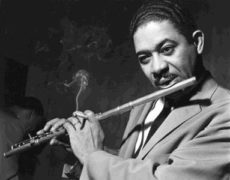
Three Wishes
When the Baroness asked Jerome Richardson what three things he would wish for he responded by saying:- “To play this horn.”
- “To be a first-class citizen.”
- “To make money.”

More Posts: baroness,flute,history,instrumental,jazz,musician,pannonica,piccolo,saxophone,three,wishes


